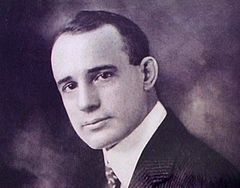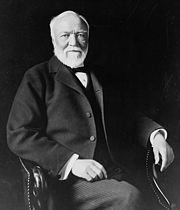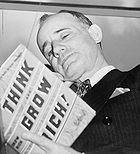- Napoleon Hill
-
Napoleon Hill 
Portrait of a young Napoleon HillBorn October 26, 1883
Pound, VirginiaDied November 8, 1970 (aged 87) Occupation author, journalist, attorney, lecturer Nationality United States Period 1928-1970 Genres non-fiction, how-to, treatise Subjects personal development, self-help, motivation, finance, investment Literary movement personal development, self-help Notable work(s) Think and Grow Rich
The Law of Success
Success Through a Positive Mental Attitude
Influences
InfluencedSignature 
The Napoleon Hill Foundation naphill.org the napoleon hill foundation
 Literature portal
Literature portalPart of a series on related to
New ThoughtMovementHistory • Discrimination • Criticism
Glossary • Literature - The Law of Success (1928)
- The Magic Ladder To Success (1930)
- Think and Grow Rich (1937)
- How to Sell Your Way through Life (1939)
- Success Through a Positive Mental Attitude (1960)
- You Can Work Your Own Miracles (1971)
- Napoleon Hill's Keys to Success: The 17 Principles of Personal Achievement
- Grow Rich!: With Peace of Mind
- The Master-Key to Riches
- Succeed and Grow Rich Through Persuasion
- Outwitting the Devil (2011) ISBN 978-1402784538
- ^ Briley, Richard Gaylord, 1995, The Seven Spiritual Secrets Of Success, p. 151, Thomas Nelson Publishers, ISBN 0-7852-8083-9
- ^ AP, November 10, 1970, 'Grow Rich' Author Dies
- ^ Hill, Napoleon (1937). Think and Grow Rich. Chicago, Illinois: Combined Registry Company. p. 14. ISBN 1605069302. http://books.google.com/books?id=v0qAh2gHd4YC&printsec=frontcover&dq=Think+and+Grow+Rich&cd=7#v=onepage&q&f=false.
- ^ Larry Chang Wisdom for the Soul, p. 514, Gnosophia Publishers, ISBN 978-0977339105
- ^ About Napoleon Hill, The Napoleon Hill Foundation.
- ^ Michael J. Ritt A Lifetime of Riches, p. 23, Dutton Book, 1995 ISBN 978-0525941460
- ^ Hill, Napoleon (1937). Think and Grow Rich. Chicago, Illinois: Combined Registry Company. p. 8. ISBN 1605069302. http://books.google.com/books?id=v0qAh2gHd4YC&printsec=frontcover&dq=Think+and+Grow+Rich&cd=7#v=onepage&q&f=false.
- ^ Dennis Kimbro, Napoleon Hill (1992). Think and Grow Rich: a Black Choice. p. 6. Random House, Inc. ISBN 978-0449219980.
- ^ Kearns, Brad (2008). How Tiger Does It. McGraw-Hill Professional. pp. 24–25. ISBN 978-0071545648.
- ^ a b Hill, Napoleon (1937). Think and Grow Rich. Chicago, Illinois: Combined Registry Company. p. viii. ISBN 1605069302. http://books.google.com/books?id=v0qAh2gHd4YC&printsec=frontcover&dq=Think+and+Grow+Rich&cd=7#v=onepage&q&f=false.
- ^ Hill, Napoleon (1937). Think and Grow Rich. Chicago, Illinois: Combined Registry Company. pp. 11, 52–63. ISBN 1605069302. http://books.google.com/books?id=v0qAh2gHd4YC&printsec=frontcover&dq=Think+and+Grow+Rich&cd=7#v=onepage&q&f=false. Retrieved 3 May 2010.
- ^ Napoleon Hill Timeline - Napoleon Hill Foundation.
- ^ Hill, Napoleon, Stone, W. Clement, Success Through A Positive Mental Attitude [Back Cover] Pocket Books (1991) ISBN 0671743228
- ^ The Business Week Best-Seller List, Business Week magazine, January 15, 2007
- ^ a b Maxwell, John A Lifetime "Must Read" Books List, March 2008
Napoleon Hill (October 26, 1883 – November 8, 1970) was an American author who was one of the earliest producers of the modern genre of personal-success literature. He is widely considered to be one of the great writers on success.[1] His most famous work, Think and Grow Rich (1937), is one of the best-selling books of all time (at the time of Hill's death in 1970, Think and Grow Rich had sold 20 million copies).[2] Hill's works examined the power of personal beliefs, and the role they play in personal success. He became an advisor to President Franklin D. Roosevelt from 1933-36. "What the mind of man can conceive and believe, it can achieve" is one of Hill's hallmark expressions.[3][4] How achievement actually occurs, and a formula for it that puts success in reach of the average person, were the focal points of Hill's books.
Contents |
Life and works
According to his official biographer, Tom Butler-Bowdon, Napoleon Hill was born in a one-room cabin in the Appalachian town of Pound in Southwest Virginia.[5] Hill's mother died when he was ten years old, and his father remarried two years later. At the age of 13, Hill began writing as a "mountain reporter" for small-town newspapers in the area of Wise County, Virginia. He later used his earnings as a reporter to enter law school, but soon he had to withdraw for financial reasons.[6]
Influence of Andrew Carnegie (1835–1919)
Hill considered the turning point in his life to have occurred in the year 1908 with his assignment, as part of a series of articles about famous and successful men, to interview the industrialist Andrew Carnegie. At the time, Carnegie was one of the most powerful men in the world. Hill discovered that Carnegie believed that the process of success could be outlined in a simple formula that anyone would be able to understand and achieve. Impressed with Hill, Carnegie asked him if he was up to the task of putting together this information, to interview or analyze over 500 successful men and women, many of them millionaires, in order to discover and publish this formula for success.[7]
As part of his research, Hill interviewed many of the most famous people of the time, including Thomas Edison, Alexander Graham Bell, George Eastman, Henry Ford, Elmer Gates, John D. Rockefeller, Sr., Charles M. Schwab, F.W. Woolworth, William Wrigley Jr., John Wanamaker, William Jennings Bryan, Theodore Roosevelt, William H. Taft and Jennings Randolph. Hill was also an advisor to two presidents of the United States of America, Woodrow Wilson and Franklin Delano Roosevelt.[8]
The Philosophy of Achievement
As a result of Hill's studies via Carnegie's introductions, the Philosophy of Achievement was offered as a formula for rags-to-riches success by Hill and Carnegie, published initially in 1925 as a multi-volume study course called The Law of Success, later re-released in 1928 in an abridged version under the same title. The Achievement formula was detailed further and published in home-study courses, including the seventeen-volume "Mental Dynamite" series until 1941.
Hill later called his personal success teachings "The Philosophy of Achievement", and he considered freedom, democracy, capitalism, and harmony to be important contributing elements to this philosophy. Hill claimed throughout his writings that without these foundations upon which to build, successful personal achievements are not possible. He contrasted his philosophy with others and thought that the Achievement Philosophy was superior. He felt that it was responsible for the success Americans enjoyed for the better part of two centuries. Negative emotions such as fear, selfishness, and others, had no part to play in his philosophy. Hill considered those emotions to be the source of failure for unsuccessful people.[9]
The secret of achievement was tantalizingly offered to readers of Think and Grow Rich, but it was never explicitly identified. Hill felt discovering it for themselves would provide readers with the most benefit. He presented the idea of a "Definite Major Purpose" as a challenge to his readers in order to make them ask themselves, "In what do I truly believe?" According to Hill, 98% of people had few or no firm beliefs, and this alone put true success firmly out of their reach.[10]
One of Hill's most moving stories was about his own son, Blair. He tells how his son was an inspiration to him, because although Blair was born without ears, without any normal hearing organs at all, even though his doctor told Hill that his son would neither be able to hear nor speak, Blair grew up to be able to hear and speak almost normally. Hill tells how his son, in his last year of college, picked up the manuscript of chapter two of Think and Grow Rich, discovered Hill's secret for himself and went on to be an inspiration for hundreds and thousands of people who could not hear or speak.[11]
From 1952-1962, Hill taught his Philosophy of Personal Achievement - Lectures on "Science of Success" in association with W. Clement Stone.[12] In 1960, Hill and Stone co-authored the book, Success Through A Positive Mental Attitude. Norman Vincent Peale stated "These two men [Hill and Stone] have the rare gift of inspiring and helping people...In fact, I owe them both a personal debt of gratitude for the helpful guidance I have received from their writings." [13]
Think and Grow Rich remains the top seller of Napoleon Hill's books - a perennial best-seller after 70 years (Business Week Magazine's Best-Seller List ranked Think and Grow Rich as the sixth best-selling paperback business book 70 years after it was first published).[14] Think and Grow Rich is listed in John C. Maxwell's A Lifetime "Must Read" Books List. [15]
Hill's numerous books have sold millions of copies, showing that the secret of achievement is still highly sought-after by many today. Hill dealt with many controversial subjects through his writings including racism, slavery, oppression, failure, revolution, war and poverty. Persevering and then succeeding in spite of these obstacles using the Philosophy of Achievement, Hill stated, was the responsibility of every human.[10]
Today's philosophy-of-success teachers still use the research formulas taught by Hill to expand their students' knowledge of personal development.[15]


